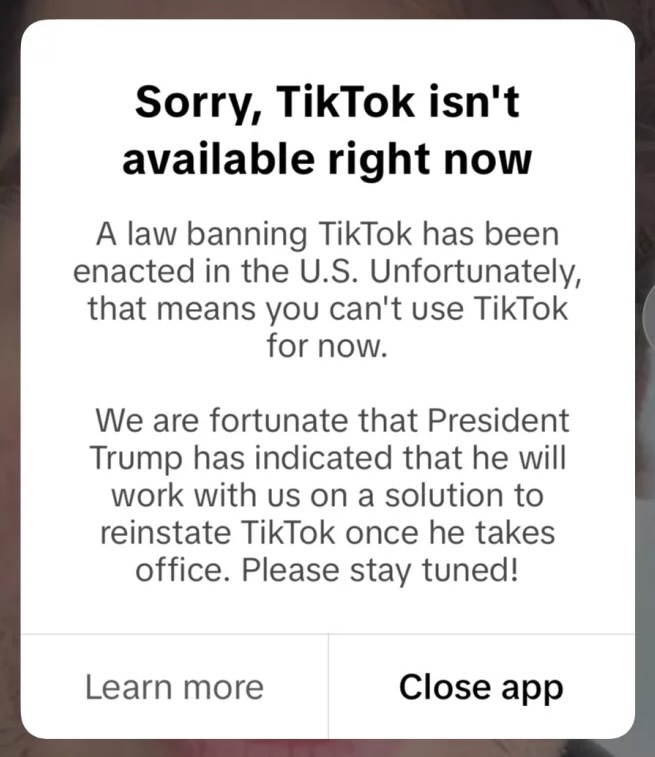Social media are going through some big changes this winter. Meta/Facebook has changed its policies banning hate speech and deceptive information on its platforms; TikTok was facing a ban, shut itself down, and then came back with the blessings of he new US president; and niche Twitter replacement Bluesky has exploded in popularity.
Today we will look at the changing fortunes of the hugely popular Chinese-owned video sharing service TikTok.
So the Chinese-owned video sharing service TikTok is the social media channel young people love and that congress, state governments, and other politicians hate/love/rinse/repeat.
Why do young people love TikTok? Here’s a video illustrating some of the most popular videos from the service in 2024.
Why do federal and state politicians want to ban it?
At the core of these attempts is that TikTok is owned by the Chinese company ByteDance. The biggest worry about TikTok is the level of information it collects about users, such as your IP address and physical location while using it. TikTok also wants you to give it access to the contacts on your phone (i.e., your lists of phone numbers and e-mail addresses). When combined with location data, this could then be used to extrapolate whom you are meeting with or talking to. Your messages on the app can be read by the company, and your viewing history is open to them as well. Is this different from any other social media company? Nope. But other social media companies don’t have direct ties to the Chinese government, either. Another major concern is that China might use the social media channel for propaganda.
During President Trump’s first term of office, he signed an executive order banning TikTok in the United States, but the ban never went into effect when American tech company Oracle contracted to host of TikTok’s US data, though TikTok would still be owned by the Chinese company ByteDance.
Then in 2024, a strongly bipartisan bill was signed into law by President Biden banning TikTok from doing business in the United States unless ByteDance sold it. How bipartisan was the bill? It passed the House by a 352-65 vote (D 155/50/8; R 197/15/7). The Senate then passed the ban as part of a larger bill including aid to Ukraine, Israel, and Gaza, by a vote of 79-18 (D 46/2/0; R 31/15/3; I 2/1/0). As can be seen, the vote in favor of the ban was overwhelming.
But there has not a lot of popular support for banning TikTok outside of state legislatures and Congress. A Pew Research study in December 2023 found only 38% of U.S. adults said they would support a government ban of TikTok, down from 50% earlier in the year. People who use TikTok are even more likely to oppose banning it, reaching only 16% support.
ByteDance went to the US Supreme Court to keep the ban from going into effect arguing that it would violate both the company’s free speech rights as well as those of its users. The court, in an unsigned opinion with no dissents, rejected the free speech challenge, allowing the ban to go into effect on Sunday, January 19, 2025, the day before President Trump would be inaugurated for his second term. In response, ByteDance took TikTok dark in the US on Saturday evening, even though the Biden administration said they would not enforce the ban.
By Sunday afternoon, TikTok was more or less back with the promise of an executive order from President Trump extending the deadline for the sale of the company. While all seemed to be happy with TikTok, many of their American service providers were not as sanguine about violating a federal law that had large fines in it.
Amazon Web Services was not providing hosting, while both Apple and Google had taken down the app from their stores. TikTokers who had deleted the app from their phones found that they could not reinstall it after the Sunday deadline has passed. According to the Washington Post, both Apple and Google have long-standing policies to for follow the laws of the countries they operate in. Apple’s tech support website had a message up dated Jan. 27, 2025 stating that they would provide neither the app nor updates to it until the legal position of the company changed.
Why did President Trump go from supporting a TikTok ban to opposing it?
It can be hard to tell, but the change happened after he met with his wealthy donor hedge fund manager Jeff Yass in March of 2024. ABC News reports that Yass has opposed anti-TikTok efforts, supporting freedom to pick between whatever apps people want to. Yass also has a “significant stake” in ByteDance, according to the Wall Street Journal. In addition, Trump has also said that banning TikTok would only help Meta/Facebook, whom he dislikes: “I don’t want Facebook… doing better. They are a true Enemy of the People!” Also, by the end of 2024, President Trump had more than 14 million followers on TikTok he was reportedly reluctant to give up.
He also discussed his change of heart during a press conference early in 2025. We’ll close out with that.

